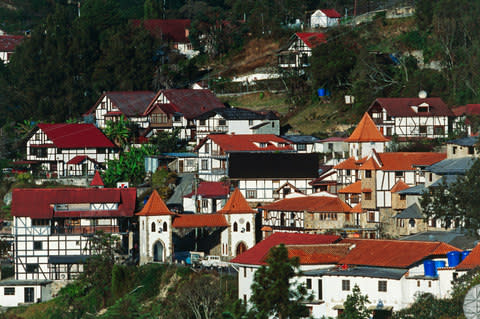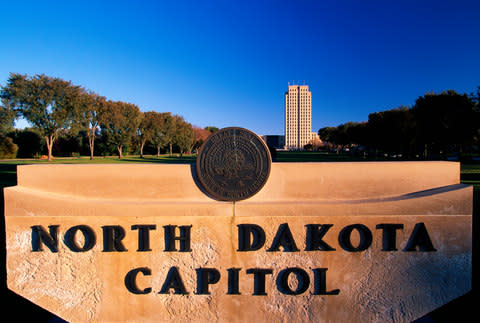The surprising German enclaves around the world that also celebrate Oktoberfest

It’s not just Germany that will be chugging steins of beer with gusto during Oktoberfest. From Canada to Namibia, expat communities around the world will be raising a glass to the feted festival of beer this month. After all, German enclaves crop up in the most unlikely places…
1. Kitchener, Canada
Formerly known as Berlin (the name was changed in 1916), this city in Ontario lays claim to the world’s second largest Oktoberfest. That’s a testament to the enduring appeal of German culture, which came to this corner of Canada in the 18th and 19th centuries, as increasing numbers of Europeans settled in North America.
Typically, the Germans brought with them a love of lederhosen, lager and, of course, bratwurst, which is celebrated during the Kitchener-Waterloo Oktoberfest. Unlike the one in Munich (which takes places in part in September), this one actually takes place in October (6-14, in case you were wondering).
2. Colonia Tovar, Venezuela
It’s a brave man or woman who travels to Venezuela at the moment (the FCO advises against travel). But if you do happen to find yourself in this troubled South American nation this October, do swing by the town of Colonia Tovar, which was founded by immigrants from the Grand Duchy of Baden (later incorporated into Germany).
Known as the “Germany of the Caribbean”, Colonia Tovar famously hosts its own version of Oktoberfest. The annual jamboree takes place amid German-style architecture, for which the town is known, and occasionally features musicians from the motherland.

3. Bismarck, United States
Bit of trivia for you: the US is home to the largest German population outside of Germany. Bismarck is perhaps the best place for Germans to pay homage to the motherland; after all, the North Dakotan capital is named after one-time German chancellor, Otto von Bismarck, who was attributed with unifying Germany in the 19th century.
The authorities hoped naming the town after Bismarck would attract German immigrants, which it did. Ensuing settlers brought an appetite for beer with them, which lives on in German-themed bars such as Lüft, where punters can quaff strong beers and sizzling bratwursts.

4. La Cumbrecita, Argentina
Telegraph Travel’s Clare Wiley recently paid a visit to La Cumbrecita, a surreal slice of Deutschland in rural Argentina. “The street signs are in German, the restaurants serve schnitzel and goulash, while the delis peddle Bavarian-style beer and jars of homemade sauerkraut,” she wrote. “It’s undeniably kitch.”
La Cumbrecita was designed as a faithful recreation of a Swiss-German village, but a gimmick it is not. The settlement was established by a German family, who migrated to Argentina in 1932 and built a holiday home in the mountains to remind them of the motherland. Find out how their little bolthole evolved into a Bavarian-style village here.

5. Windhoek, Namibia
A former German colony, Namibia is officially one of the thirstiest nations in Africa. A coincidence? Perhaps not. There’s plenty of evidence some Germanic culture remains, not least in the profusion of beer houses and the annual Oktoberfest celebrations.
A word of warning if you’re thinking of getting stuck in: according to local media reports, pedestrians can now be done for drink-walking. Yes, really: in a bid to crack down on alcohol-related road accidents, the Windhoek City Police has reportedly started treating pedestrians in the same way as they would drivers – by breathalysing them at the scene of an accident. You’ve been warned.
6. Sao Paulo, Brazil
After the US, Brazil is the second most popular destination for German expats. According to immigration studies more than a quarter of a million Germans settled in the South American nation between 1820 and 1972, most of whom chose to live in the country’s southern regions.
Sao Paulo was particularly popular and the city is today home to many German-themed bars and restaurants. Oktoberfest is celebrated in towns across the country. Jamborees to look out for include Oktoberfest of Blumenau and Oktoberfest of Itapiranga.

7. Valdivia, Chile
Chile was, surprisingly, another popular destination for German citizens who were looking to start afresh in the 19th century. Sailing from Hamburg, many people from Germany made their way to the port city of Valdivia in southern Chile, where they have since exerted influence in everything from architecture to – yup, you guessed it – beer.
The city hosts its own version of Oktoberfest, dubbed Bierfest Valdivia, which is typically held in January when the weather is fine and the tourists are in town.
A post shared by Gerardo Haeger Sepulveda (@ghaeger) on Jan 27, 2017 at 5:32am PST
8. Galápagos, Ecuador
There is little visible evidence of Germany’s unofficial colonisation of Floreana in Galapagos – no beer halls or Bavarian-style houses here – but the island has a fascinating German history that has more twists and turns (and a greater body count) than an Agatha Christie novel.
Telegraph Travel’s Gavin Haines learned all about it on a recent visit to the islands. Read his remarkable account of the German history of Galapagos – also known as the Galapagos Affair – here or see below for a quick overview.


